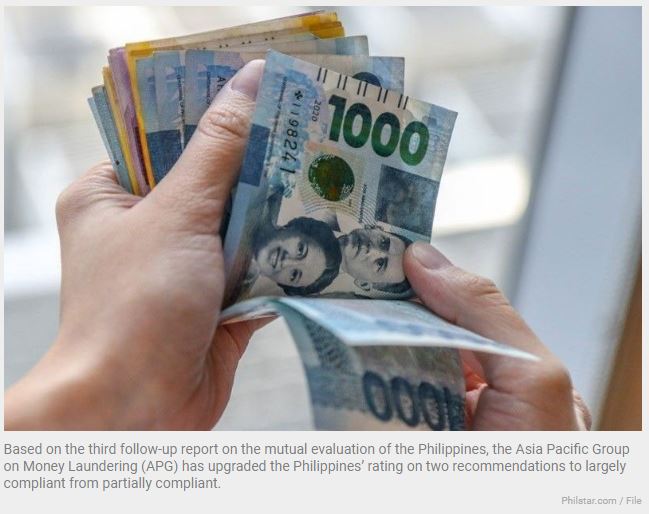Philippines making gains in resolving anti-money laundering issues
MANILA, Philippines — The Philippines continues to make progress in addressing technical compliance deficiencies in its anti-money laundering and combating the financing of terrorism (AML/CFT) framework ahead of the deadline set by Paris-based global dirty money watchdog Financial Action Task Force (FATF).
Based on the third follow-up report on the mutual evaluation of the Philippines, the Asia Pacific Group on Money Laundering (APG) has upgraded the Philippines’ rating on two recommendations to largely compliant from partially compliant.
The APG said the Philippines has addressed the moderate deficiencies in relation to the regulation of designated non-financial businesses and professions (DNFBPs), particularly the procedures of Philippine Amusement and Gaming Corp. (PAGCOR) licenses covering only board of directors and not shareholders or beneficial owners, as well as the absence of information on the fit and proper framework for land-based casinos under the supervision of the Cagayan Economic Zone Authority (CEZA) and the Aurora Pacific Economic Zone and Freeport Authority (APECO).
At its peak in February last year, there were 50 PAGCOR and 25 CEZA offshore gaming licensees, from only four at the time of mutual evaluation report in 2019.
However, the number has since declined to 35 PAGCOR licensees, of which only 26 are operational, and eight CEZA licensees, of which none are operational effective February 2022 due to recent Bureau of Internal Revenue (BIR) enforcement action.
The deficiency included real estate agents who are not covered persons subject to any AML/CFT framework.
The APG said PAGCOR has issued an approved additional probity check guidelines that took effect in January, while the Anti-Money Laundering Act (AMLA) and its implementing rules and regulations have been amended to include real estate developers and brokers as covered persons.
It said the Philippines has continued to develop a framework for risk-based supervision of the DNFBP sector.
Furthermore, the APG said the Philippines has also addressed Recommendation 32 involving the absence of a competent authority to request and obtain further information from the carrier in cases where there is a false declaration or a failure to declare.
Likewise, the penalties for the offence by way of imprisonment were not proportionate nor dissuasive as well as the issue wherein competent authorities were not clearly empowered to restrain currency and bearer of negotiable instruments suspected of money laundering, terrorism financing or other predicate offences.
According to APG, the Philippines has demonstrated that the Bureau of Customs (BOC) has implied authority to request and obtain further information from carrier in case of false declaration, while setting proportionate and dissuasive fines for false declaration or failure to declared depending on the monetary value of goods unlawfully imported or exported.
“Overall, the Philippines has made good progress in addressing the technical compliance deficiencies identified in its mutual evaluation report and has been re-rated as largely compliant for Recommendations 28 and 32,” the APG said.
Given the results of the latest follow-up report, the APG placed the Philippines on enhanced follow-up instead of the previous enhanced expedited follow-up.
Despite the re-ratings, the Philippines remains partially compliant with regards to three concerns including Recommendation 15 covering new technologies, Recommendation 25 pertaining to transparency and beneficial ownership of legal arrangements, and Recommendation 39 covering extradition.
June, the FATF retained the Philippines in its ‘gray list’ as it stressed the need for the country to further strengthen its action plan to address strategic deficiencies in their regimes to counter money laundering, terrorist financing, and proliferation financing.
The global dirty money watchdog has retained the Philippines in the list of jurisdictions under increased monitoring due to strategic deficiencies that included 22 other countries released during the recently concluded hybrid FATF plenary from June 14 to 17.
Since its re-inclusion in the gray list in June last year, the Philippines made a high-level political commitment to work with the FATF and APG.
The Anti-Money Laundering Council is confident the Philippines would be removed from the gray list on or before January 2023 as the country has committed to resolve swiftly the identified strategic deficiencies within agreed timeframes.
Source: https://www.philstar.com/business/2022/08/04/2200060/philippines-making-gains-resolving-anti-money-laundering-issues


 English
English




